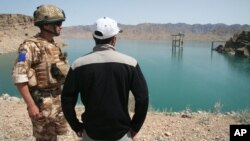Afghan governors in southern and western provinces charged on Monday that Iran is using an increasingly close relationship with the Afghan Taliban to target power and water projects on Tehran's behalf.
Hayatullah Hayat, the governor of southern Helmand province, told VOA's Afghan service that the Islamic Republic wants the Taliban to disable some of the nation's dams so that Tehran can get a larger share of water from the Helmand River. He cited classified Afghan intelligence reports forwarded to the Afghan palace and the National Security Council.
“Iran is seeking to undermine the development projects over the Helmand River so that it can continue receiving more water," Hayat said.
The Helmand governor accused elements in Iran's elite Revolutionary Guard forces of providing sophisticated weapons to the Taliban that could be used to attack government installations and infrastructure. He said several unexploded mortar missiles used by the Taliban bore an Iranian manufacturer's mark and were fired at the provincial capital.
The governor added that Iran's intelligence representatives recently met with local Taliban leaders in Helmand's volatile Garmser district.
Water scarcity an issue
Iran's Embassy in Kabul declined to comment on Monday when contacted by VOA. Tehran has denied the accusations of close association with the Taliban, saying it has close relations with the government of Afghanistan.
Water scarcity is a major issue in parts of Asia, and Iranian authorities have been pushing for a larger share of water supplies from Afghanistan which has been building dams for irrigation and power needs. The two neighboring countries signed a water-sharing treaty in 1973 which says that Iran shall not make claims to water from the Helmand River in excess of amounts agreed to in the treaty, even if additional water becomes available in the future.
Iran has voiced concerns that several water management projects in progress in western and southern Afghanistan, including Herat province's newly Indian-funded hydroelectric and irrigation project known as Salma Dam, may reduce the flow of water into Iran.
Water deal terms are set
The Afghan government has downplayed Iranian concerns and said that the projects will not affect the amount of water flowing into Iran. Afghan President Ashraf Ghani said that Iran continues to receive its share of water from Helmand River and that the country cannot claim more than what has been agreed upon.
Some Afghan experts say that if Iran wants more water, it should cut a deal with Afghanistan.
“We know Iran wants more water than allocated to it in the water-sharing treaty,” Wadir Safi, a professor of law and political science at Kabul University told VOA. “If Iran wants more water beyond the amount agreed in the treaty, it should consider buying additional water from Afghanistan.”
The allegations of Taliban involvement in the water dispute comes as Kabul is becoming increasingly concerned about Iran's alleged meddling in Afghan provinces that border Iran. The Afghan Senate last month ordered an investigation into Iran's reported association with the Taliban.
Access to weapons a concern
Afghan regional officials say the Taliban has recently increased its terror activities in various provinces.
“The abundance of new weapons and ammunitions in Taliban's possession has created many questions and doubts,” Asif Nang, the governor of western Farah province told VOA on Monday. Nang added that the Taliban can receive weapons “within an hour” from Iran, given the proximity of his province to the border.
Last month, Nang accused Iran of harboring Taliban families in its territory.
“Families of a number of high-ranking Taliban leaders reside in Iran,” Nang told Radio Liberty last month. “They live in cities such as Yazd, Kerman and Mashhad, and come back to Afghanistan for subversive activities.”
The Taliban's former leader, Mullah Akhtar Mansoor, was killed in a U.S. drone strike in Pakistan last year and was reportedly returning from Tehran after holding meetings in Iran.




